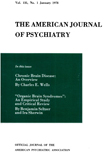CLINICAL TRIAL OF A NEW ANTIDEPRESSANT (DESIPRAMINE HYDROCHLORIDE) IN A HOSPITAL SETTING
Abstract
Desipramine, the monomethyl metabolite of imipramine, was used as the basic treatment of 20 patients with severe or moderately severe depression. A fixed dose of 50 mg. q.i.d. was given, and drug effects were evaluated in terms of changes in target symptoms, onset of action and side effects.
Complete remission or improvement permitting discharge from hospital was obtained in 14 patients (70%). The time to onset of observable response averaged 2 days, while peak antidepressant action occurred after an average of 5.5 days.
Side effects were encountered in one patient and consisted of gastro-intestinal upset, dry mouth and drowsiness. Medication was discontinued in this case. No significant effects on blood pressure, peripheral blood picture, urine or liver function were observed.
Desipramine appeared to be an effective and well-tolerated antidepressant similar in its activity to imipramine. With the substantial initial dosage used, the relatively prompt onset of action seems to be the prime advantage of the drug in treating serious depressions.
Access content
To read the fulltext, please use one of the options below to sign in or purchase access.- Personal login
- Institutional Login
- Sign in via OpenAthens
- Register for access
-
Please login/register if you wish to pair your device and check access availability.
Not a subscriber?
PsychiatryOnline subscription options offer access to the DSM-5 library, books, journals, CME, and patient resources. This all-in-one virtual library provides psychiatrists and mental health professionals with key resources for diagnosis, treatment, research, and professional development.
Need more help? PsychiatryOnline Customer Service may be reached by emailing [email protected] or by calling 800-368-5777 (in the U.S.) or 703-907-7322 (outside the U.S.).



